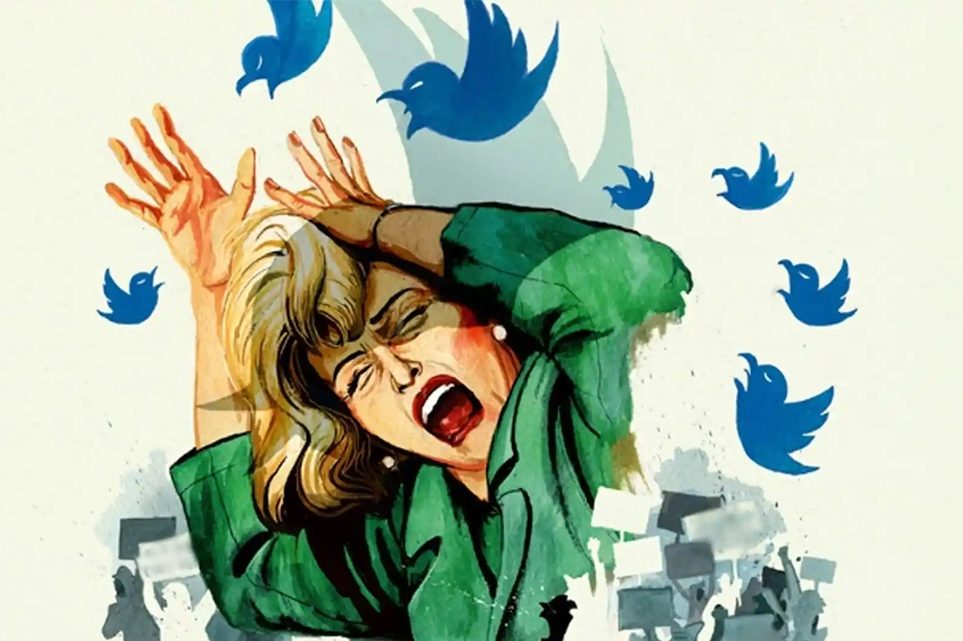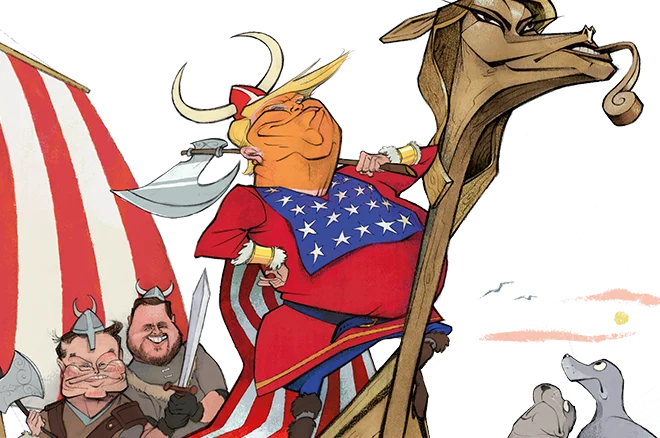In Michel Houellebecq’s satirical novel Soumission, the French elite submits to Islamic rule rather than accept a Rassemblement National government. Nine years after its publication, submission seems more imminent on this side of the English Channel.
My American friends are surprised to learn there’s no equivalent to the First Amendment in Britain. They have forgotten a free press was one of the things their ancestors rebelled to establish in the US. Free speech is a much more recent thing in the UK. If it was born in the 1960s, it seems to be dying in the 2020s.
If free speech in the UK was born in the 1960s, it seems to be dying in the 2020s
After the recent riots, people were given prison sentences for posting words and images on social media. In some cases, the illegal incitement to violence was obvious. Julie Sweeney, fifty-three, got a fifteen-month sentence for a Facebook comment: “Blow the mosque up with the adults in it.” Lee Dunn, fifty-one, on the other hand, got eight weeks for sharing three images of Asian-looking men with captions such as “Coming to a town near you.”
;768:[300×250,336×280,320×100];0:[300×250,320×100,320×50]”]As these sentences were delivered, the government announced its intention to axe the Higher Education (Freedom of Speech) Act. Education Secretary Bridget Phillipson said the act, which requires universities and students’ unions to protect free speech and academic freedom, would place too much of a burden on universities and expose them to costly legal action. But there’s been speculation the real motive for ditching it is to avoid antagonizing China, a country noted for the number of students it sends to the UK, not for its commitment to free speech.
When I came to the West in 1992, free speech seemed a settled issue. From defamation to fraud, perjury to libel, insult to incitement, the legal limits were largely decided. Some European countries kept blasphemy laws, but these were dead letters. We understood why Mein Kampf was banned in Germany but not in the US. Each country had taken a different historical journey towards the liberal end of history.
Beginning in the 1960s, the UK moved away from a paternalistic regime of censorship and censoriousness. The British were proud of their new-found free speech, including their tolerance for lèse-majesté and blasphemy. Think of the impotence of the BBC’s ban on the Sex Pistols’ “God Save the Queen” or the success of Monty Python’s Life of Brian.
But a triple whammy towards the end of the twentieth century upended this: the arrival of fundamentalist Islam in the West, the rise of far-left critical theories of social justice and the advent of the internet as the public square.
The clash between fundamentalist Islam and modern British values became clear in 1989, when Ayatollah Ruhollah Khomeini, the Iran’s supreme leader, issued a fatwa against Salman Rushdie for The Satanic Verses. At the time, Margaret Thatcher provided Rushdie with taxpayer-funded protection. The message was clear: Britain wouldn’t submit to foreign actors who threatened murder in pursuit of censorship. It wasn’t enough. The threat to Rushdie continued, very nearly claiming his life two years ago.
;768:[300×250,336×280,320×100];0:[300×250,320×100,320×50]”]Those who expressed concern about the cultural differences with fundamentalist Islam were condemned as xenophobic. Even the police feared confronting Muslim men who ran grooming gangs for fear of being viewed as racist.
The second trend was the rise of far-left ideas within the Labour Party. Though Jeremy Corbyn was too obvious a leftist for British voters, Keir Starmer successfully presented himself as a harmless alternative to an inept Tory government.
Now his government seems intent on enshrining a definition of Islamophobia in law, using the All-Party Parliamentary Group (APPG) on British Muslims’ definition of Islamophobia as “a type of racism that targets expressions of Muslimness or perceived Muslimness.” In opposition, Labour consistently supported adopting it. Health Secretary Wes Streeting was the APPG’s chairman. Starmer reportedly intends to introduce the definition in a non-legally binding fashion, similar to Theresa May’s antisemitism definition in 2016. But I agree with those, such as Bob Blackman, the chairman of the 1922 Committee, who warn this is a move towards a blasphemy law. Blackman should know. He was accused in parliament of Islamophobia for sharing a post critical of sex gangs in the UK.
The third force at work is the internet, which gave Islamists and the radical left the chance to reach impressionable youths. It particularly suited them in 2020 when the most popular platforms made clear they would adopt critical race theory and other elements of woke ideology, under the guise of “content moderation.”
Of course, some internet regulation is necessary to prevent it becoming a bazaar for child pornography, drugs and weapons. But conservatives underestimated how regulation could morph into a regime of surveillance and censorship. The Online Safety Act was passed by the Tory government in October last year. As Fraser Nelson argued, it could serve as a “censor’s charter” because of its inclusion of the phrase “legal but harmful” to characterize certain content.
Now the left wants more. London mayor Sadiq Khan said after the riots that amendments are needed. He described the act as no longer “fit for purpose.” Peter Kyle, the science and technology secretary, added that the government is committed to “building on the Online Safety Act” — whatever that means.
;768:[300×250,336×280,320×100];0:[300×250,320×100,320×50]”]The losers in all this are not the hapless fools languishing in jail because of their crude online posts. The losers are the millions of people who believe the government exists to protect us from foreign enemies and criminals, not to prohibit ideas, words or images that might offend. The winners? That unholy alliance of Islamists and leftists who want to use the state to impose their dogmas on everyone else.
This article was originally published in The Spectator’s UK magazine. Subscribe to the World edition here.

























